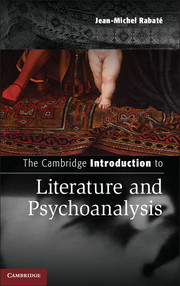Book contents
- Frontmatter
- Contents
- Acknowledgments
- Introduction
- Chapter 1 Freud’s theater of the unconscious
- Chapter 2 Literature and fantasy, toward a grammar of the subject
- Chapter 3 From the uncanny to the unhomely
- Chapter 4 Psychoanalysis and the paranoid critique of pure literature
- Chapter 5 The literary phallus, from Poe to Gide
- Chapter 6 A thing of beauty is a Freud forever
- Chapter 7 From the history of perversion to the trauma of history
- Conclusion
- Keywords and Index of Authors
- Bibliography
- Index
- References
Conclusion
Ambassadors of the unconscious
Published online by Cambridge University Press: 05 September 2014
- Frontmatter
- Contents
- Acknowledgments
- Introduction
- Chapter 1 Freud’s theater of the unconscious
- Chapter 2 Literature and fantasy, toward a grammar of the subject
- Chapter 3 From the uncanny to the unhomely
- Chapter 4 Psychoanalysis and the paranoid critique of pure literature
- Chapter 5 The literary phallus, from Poe to Gide
- Chapter 6 A thing of beauty is a Freud forever
- Chapter 7 From the history of perversion to the trauma of history
- Conclusion
- Keywords and Index of Authors
- Bibliography
- Index
- References
Summary
In February 2012, President Barack Obama wrote a letter to Yann Martel congratulating him on the powerful effect Life of Pi had on him and his daughter: “My daughter and I just finished reading Life of Pi together. Both of us agreed we prefer the story with animals. It is a lovely book – an elegant proof of God, and the power of storytelling.” Freud would have agreed with the second part of the assessment, not necessarily with the first – unless a belief in storytelling inevitably entails a belief in God. That would be Nietzsche’s thesis: we still believe in God, he argued, just because we believe in grammar (hence, in logic and essences). Freud believed in grammar, but he did not believe in God, at least if we trust the many statements he made to that effect. This was not just his personal disposition; it has to do with the whole effect of psychoanalysis. In a text originally written as an introduction to the works of Freud in Japanese translation, Jean-Luc Nancy has observed that psychoanalysis provides the only consistent atheistic discourse of the twentieth century, adding that, for this reason, it cannot even believe in itself.
Allegories of the Unconscious
Here is the gist of Nancy’s argument: Freud’s invention of psychoanalysis cannot be restricted to knowledge. Psychoanalysis is also a clinical practice, and as such its operative concepts rely on (and relay) the singularity of each case. He adds: “This is why Freud’s invention is one of the most clearly and most resolutely non-religious of modern inventions. Also why it cannot believe in itself.” Nancy, who can be very critical of Lacan, has seen a fundamental feature of Freud’s thought, which agrees with the internal division posited by Ruth Leys in her book on trauma. All his life, from the letters to Fliess to the analysis of the Wolfman, Freud continued to hesitate between the postulation of a real event and the postulation of a hallucinated event in any trauma.
- Type
- Chapter
- Information
- The Cambridge Introduction to Literature and Psychoanalysis , pp. 199 - 214Publisher: Cambridge University PressPrint publication year: 2014

